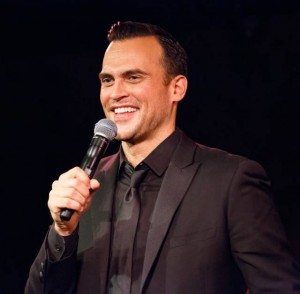

Two Cheyenne Jacksons are making their Café Carlyle debut: Cheyenne Jackson the handsome actor-singer of stage, film, and television; and Cheyenne Jackson the man, who has faced a number of personal challenges and tells us about them. Headliners at the upper echelon of clubs may sometimes talk about their careers, but it's quite rare for them to share private feelings and experiences. That sort of thing is more commonly indulged in by relative newcomers in the smaller clubs—and it's far more often than not a mistaken choice. In this instance, however, both the artist and the man score.
Opening with a vigorous and immensely satisfying rendition of "Stand By Me" (Ben E. King, Lieber & Stoller), Jackson displays a beautiful, powerful, and resonant voice. (Throughout the evening he shows us its other colors and qualities.) Contributing to the appeal of this number is the accompanying Latin rhythm, especially in the bass and drums. On Consuelo Velazquez's "Besame Mucho" a bit later, he makes a 180-degree turn: the Latin rhythm of this Mexican classic is de-emphasized, and he sings Sunny Skylar's English lyric, rather than the more simple-minded and repetitious original Spanish version (or the similar English translation that many singers choose); the result is a triste and sober expression of a deeper and more mature love.
On an Elvis Presley medley, Jackson infectiously throws himself into "(Let Me Be Your) Teddy Bear" (Kal Mann, Bernie Lowe), then turns in a simple and simply beautiful "Can't Help Falling in Love" (Hugo Peretti, Luigi Creatore, George David Weiss). His delivery of George Michael's "Kissing a Fool" is a pleasing combination of pop and swing, and his "Falling Slowly" (Glen Hansard, Markéta Irglová, from Once) is haunting.
There are a few missteps and near-misses. The Gershwins' "A Foggy Day" is excessively bouncy—Jackson sings the rhythm and tempo rather than telling a story. Into Duke Ellington and Bob Russell's "Don't Get Around Much Anymore," he inserts extraneous words—for example, "I got as far as the door" and "I've been invited on dates" and "why stir up all those long-lost memories"; this diminishes the colloquial directness of Russell's original lyric. "The Edge of Glory" (Lady Gaga, Fernando Garibay, DJ White Shadow) gets big rather arbitrarily. By contrast, Joni Mitchell's "A Case of You" (in an arrangement by Diana Krall) grows organically; indeed, his is one of the finest and most beautiful renditions of this song I've ever heard.
Jackson gets fine support from musical director Willy Beaman on piano, Vancil Cooper on drums, and Michael O'Brian on bass. Jackson and Beaman appear to have a warm rapport with each other; in addition, Beaman delivers a lovely piano solo of Arlen's music to "Over the Rainbow."
That was Jackson, the artist; now to Jackson the man. One might charge that revelations about his personal trials and tribulations—his divorce, deaths in his family, his fight against alcoholism, etc.—do not belong in a cabaret show performed for an audience of strangers; that they should more properly be directed to his best friends or to a therapist. Quite right. However, he is so open about these intimate matters, and he talks about them so naturally, with no trace of artifice, that we respond not as an audience, but as fellow human beings. What's more, he is as disarming and ingratiating when discussing his struggles as when regaling us with hilarious Elaine Stritch anecdotes.
"Eyes Wide Open"
Café Carlyle – January 13-24